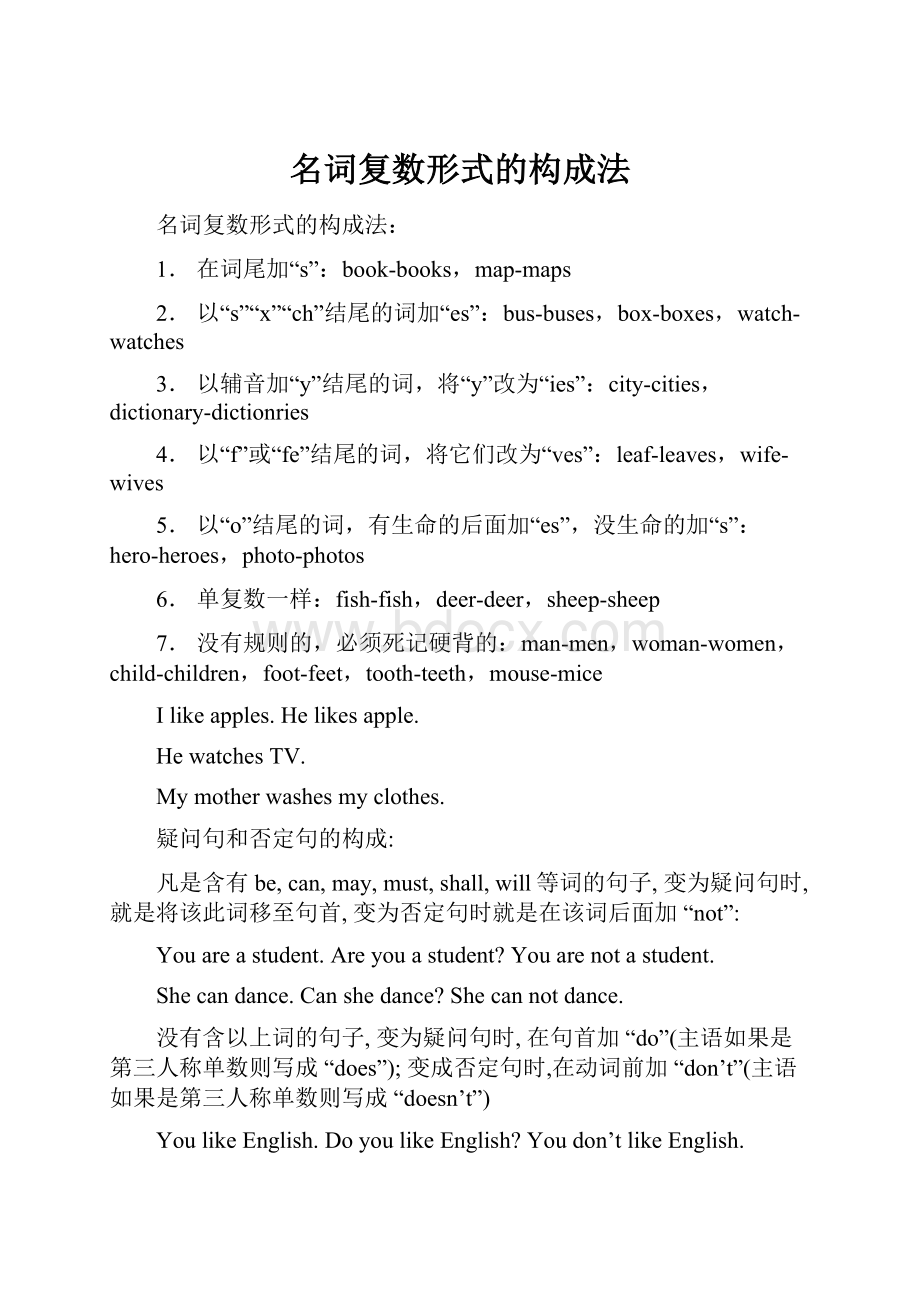名词复数形式的构成法.docx
《名词复数形式的构成法.docx》由会员分享,可在线阅读,更多相关《名词复数形式的构成法.docx(10页珍藏版)》请在冰豆网上搜索。

名词复数形式的构成法
名词复数形式的构成法:
1.在词尾加“s”:
book-books,map-maps
2.以“s”“x”“ch”结尾的词加“es”:
bus-buses,box-boxes,watch-watches
3.以辅音加“y”结尾的词,将“y”改为“ies”:
city-cities,dictionary-dictionries
4.以“f”或“fe”结尾的词,将它们改为“ves”:
leaf-leaves,wife-wives
5.以“o”结尾的词,有生命的后面加“es”,没生命的加“s”:
hero-heroes,photo-photos
6.单复数一样:
fish-fish,deer-deer,sheep-sheep
7.没有规则的,必须死记硬背的:
man-men,woman-women,child-children,foot-feet,tooth-teeth,mouse-mice
Ilikeapples.Helikesapple.
HewatchesTV.
Mymotherwashesmyclothes.
疑问句和否定句的构成:
凡是含有be,can,may,must,shall,will等词的句子,变为疑问句时,就是将该此词移至句首,变为否定句时就是在该词后面加“not”:
Youareastudent.Areyouastudent?
Youarenotastudent.
Shecandance.Canshedance?
Shecannotdance.
没有含以上词的句子,变为疑问句时,在句首加“do”(主语如果是第三人称单数则写成“does”);变成否定句时,在动词前加“don’t”(主语如果是第三人称单数则写成“doesn’t”)
YoulikeEnglish.DoyoulikeEnglish?
Youdon’tlikeEnglish.
HelikesEnglish.DoeshelikeEnglish?
Hedoesn’tlikeEnglish.
Theyarefarmers.Aretheyfarmers?
Theyaren’tfarmers.
Hebuysacar.Doeshebuyacar.Hedoesn’tbuyacar.
Youplayfootball.Doyouplayfootball?
Youdon’tplayfootball.
Hecansingwell.Canhesingwell?
Hecan’tsingwell.
肯定句的主语如果是第一人称,在疑问句中要改为第二人称.
Wearestudents.Areyoustudents?
Iamateacher.Areyouateacher?
Ilikemymother.
Doyoulikeyourmother?
肯定句中的“some”,在疑问句和否定句中都要改为“any”
Ihavesomemoney.
Doyouhaveanymoney.
Idon’thaveanymoney.
Therearesomebooks.
Arethereanybooks.
Therearen’tanybooks.
Icanseesomestarsinthesky.
Welikeourschool.
Wegotoschooleveryday.
Hehasanewcomputer.
Thenewbagismine.
一般现在进行时:
“be+动词ing”
1.表示该动作此时此刻正在发生,或正在进行.
WearelearningEnglishintheclassroomnow.
Heisplayingfootballontheplayground.
2.表示该动作计划好,安排好在将来发生(只有少数动词可以这样用)Theyarecomingheretomorrow.
IamleavingXiamentomorrow.
3.表示该动作在目前这段时间里频频地发生,而不是每时每刻都在发生.
Heisreviewinghislessonsthisweekforthetestsnextweek.
将来时:
在动词之前加shall(用于第一人称),或will(用于其他人称)
IshallgotoBeijingnextweek.
WeshallgotoBeijingnextweek.
TheywillgotoBeijingnextweek.
还可以在动词前加“begoingto”表示这个动作计划好,安排好在将来发生.
Iamgoingtobuyacarnextyear.
Theyaregoingtobuyanewhousenextweek.
Heisgoingtoplaybasketballtomorrow.
Red,green,blue,brown,black,white,pink,purple,gray
Yellow
Tiger,lion,bear,panda,parrot,whale,cock,rooster,goat,cow,koala,deer,giraffe,penguin,dog,cat,mouse,ant,snake,pig,rabbit,
Park,garden,library,museum,palace,postoffice,bank,factory,
Ruler,eraser,knife,bottle,shoe,shirt,skirt,suit,mobilephone,picture,bike,truck,watch,necklace,ring,bowl,towel,spoon,chopsticks,mirror,sofa,bed,chair,kite,key,lock,computer,motor-bike,
Apple,orange,pear,peach,banana,watermelon,pineapple,
Speak,walk,run,swim,puton,takeoff,lookfor,lookafter,takecareof,gotobed,getup,geton,getoff,buy,sell,listento,lookat,give
art,activity,address,accident,accept,adult,advice,adjust,admire,achieve,accountant,affair,affect,afraid,Africa,again,age,agree,agriculture,airline,airport,allow,almost,alone,already,although,altogether,always,among,analyze,
ancient,application,balance,background,bank,band,basis,bath,beach,bear,beat,beauty,beef,beer,believe,bell,belongto,bend,benefit,beside,besides,between,beyond,Bible,bill,billion,biology,birthday,bite,blind,blood,boat,body,boil,bomb,bone,born,borrow,boss,bottle,bottom,bowl,brain,brave,bread,breathe,brick,bridge,bright,bring,brown,budget,build,burden,burn,bury,business,calculate,cake,calendar,calm,camera,campus,Canada,cancel,cancer,capital,captain,carbon,card,care,career,careful,careless,cash,cashier,cause,celebrate,center,century,ceremony,certainly,certificate,chain,chair,chairman,challenge,chat,cheap,cheat,check,cheer,chemistry,chicken,chief,child,childhood,chocolate,choose,choice,Christmas,church,cigarette,cinema,circle,classical,classmate,schoolmate,classroom,clean,clear,clerk,clever,climate,climb,clock,close,clothes,cloud,club,coach,coal,coast,coat,cock,coffee,coin,cold,colleague,collect,college,color,comb,combine
Habit,hobby,holiday,hospital,history,insurance,invite,
Invent,instead,island,issue,jump,join,joke,judge,
Kill,juice,labour,language,lady,leader,laugh,law,lecture,lazy,liquid,literature,lock,location,lonely,loud,machine,magazine,mail,main,mall,SM=shoppingmall,male,female,meal,mean,meat,medicine,measure,mention,memory,menu,middle,million,mind,minute,
Mistake,modern,monitor,murder,music,nature,narrow,wide,need,necessary,near,neighbor,nervous,never,next,noise,notebook,novel,number,office,often,
Online,opera,opportunity,orange,outside,overcoat,
Owe,own,page,pain,paint,pair,paper,paragraph,
Parent,part,park,parking,partner,patient,peace,pear,
Percent,perfect,perhaps,
情态动词:
may(可以,可能),can(能,会),must(必须,一定),need(必须,需要),shall(将,必须),will(将),oughtto(应该)
1.MayIuseyourruler?
Youmayusemyruler.
2.HemaybeateacherbutIamnotsure.
3.Hemaynotbeteacher.
4.Shecandancewell.Hecandrive.
5.WemustlearnEnglish.
6.Hemustbeablack.
7.Youneeddoitnow.
8.Ishallwritetoyou.
9.Heshallgethereby10:
00.
10.Theywillcomeheretomorrow.
变为否定句时,在其后面加not,变为疑问句时,将该词移至句首
MayIuseyourpen?
Yes,youmay/can
No,youcan’t
每一个动词都有3种形式,它们分别是
原形过去时过去分词
ReadreadreadAAA
ComecamecomeABA
BuyboughtboughtABB
BeginbeganbegunABC
英语动词的时态:
过去时:
表示该动词发生在过去,句子中一般有表示过去的时间.
Wewenttotheparkyesterday.
Theycametoourschoollastweek.
Didyouhearme?
过去进行时:
1.表示该动作在过去的某段时间内或某个时间点正在进行:
Wewereplayingbasketballyesterdayafternoon.
HewaswatchingTVwhenIcalledhim.
2.可以表示该动作在过去某个时间的将来要发生(但是只限制于少数的动词).
Hesaidyesterdaythathewascomingherenextweek.
3.可以表示该动作在过去的某段时间内频频地发生,但并不是每时每刻都在发生.
Wearereviewingourlessonsthisweekfortheexamnextweek.
Wewerereviewingourlessonslastweekfortheexamthisweek.
过去将来时:
“woulddo”
表示该动作要在过去某个时间的将来发生.
Hetoldmeyesterdaythathewouldcometoseeme.
Theysaidthattheywouldhelpuswiththework.
Hewillbuyacartomorrow.
Heisgoingtobuyacartomorrow
Hesaidlastweekthathewouldbuyacar.
Hesaidlastweekthathewasgoingtobuyacar.
现在完成时:
“have+过去分词”(中文中的“已经”,“了”,“过”,在英文中都必须用完成时来表示).
1.表示该动作刚刚做过,并且,对目前产生一定的影响或结果.Ihaveopenedthedoor.我把门打开了.
Ihaveopenedthebook.我把书打开了.
2.表示该动作发生在过去,但是,它主要是要说明对目前产生的影响和结果.Ihaveseenthemovie.我看过这部电影.
3.表示该动作从过去的某个时间开始发生,一直延续到现在(只限制于可延续性的动词).
IhavelivedinXiamenfor10years.我在厦门住了10年了.
WehavelearnedEnglishforonemonth.
Hehascomeintotheroomforanhour.
Hehasbeenintheroomforanhour.
Ihaveborrowedthebookforoneweek.
Ihavekeptthebookforoneweek.
Hehasboughtthebikeforoneyear.
Hehashadthebikeforoneyear.
HehasleftXiamenfor10years.
HehasbeenawayfromXiamenfor10years.
Hehashadhissupper.Hashehadhissupper?
Hehasnothadhissupper.
Breakfast,lunch,supper
Dinner
Have,eat,drink
Hehasanappleandsomewater.
Heeatsanapple.
Hedrinkssomewater.
Ieatbreakfastathome.
Havegoneto…去了某地(人目前没在说话现场)
Havebeento…去过某地(人目前已经没在那里)
Havebeenin…在某地(已有一段时间了)
HehasgonetoBeijing.
HehasbeentoBeijing.HewenttoBeijing.
HehasbeeninBeijingforoneweek.
现在完成进行时:
“have+been+doing”
表示该动作从过去某段时间开始发生,延续至今,并且还要再继续延续下去.
Ihavewaitedforthebusfortwentyminutes.Thebusiscoming.Iwillgetonthebus.Bye!
Ihavebeenwaitingforthebusfortwentyminutes,butthebushasn’tcomeyet.Ihavetogoonwaiting.
过去完成时:
“had+过去分词”
表示这个动作在过去的某个时间之前就发生过了.
Hetoldmeyesterdaythathehadseenthemovie.
TomhadlearnedChinesebeforehecametoChina.
被动语态:
“be+过去分词”
IlikeEnglish.Englishislikedbyme.
Heplaysfootball.Footballisplayedbyhim.
Theyboughtacaryesterday.Acarwasboughtbythemyesterday.
情态动词后的被动语态:
“情态动词+be+过去分词”
Theworkcanbefinishedinanhour.
Anewhospitalwillbebuiltherenextyear.
Theworkmustbedonerightaway.
正在进行时的被动语态:
“be+being+过去分词”
Thehouseisbeingbuilt.
Thestudentsarebeingpraisedbytheteacher.
Mywatchisbeingrepaired.
Carsarebeingmadeinthefactory.
完成时的被动语态:
“have+been+过去分词”
Themoviehasbeenshownmanytimes.
Manytreeshavebeenplantedthisyear.
Thee-mailhasbeensenttoTom.
Alotofnewbuildingshavebeenbuiltsince2000.
Bythetime+过去时的句子或过去的时间,主句一定要用过去完成时:
BythetimeIgothome,myparentshadgonetobed.
Bythetimeoflastmonth,wehadlearned200Englishwor
ds.
Bythetime+将来的时间,主句一定用将来完成时:
Bythetimeofnextyear,wewillhavelearned800Englishwords.
ThisisthefirsttimethatIhavebeenlateforschool.
Thisisthesecondtimethathehaseatenthefood.
ThiswasthethirdtimethatIhadmademistakes.
It+takes+某人+时间+todo…:
花某人时间做某事
Itusuallytakesmetwohourstodomyhomework.
Ittookhimanhourtocleanthehouseyesterday.
人+spend+时间+(in)doing…:
人花时间做某事
Iusuallyspendtwohoursdoingmyhomework.
Hespentanhourcleaningthehouseyesterday.
Hadbetterdo…最好做…
Youhadbettertakeoffyourshoes.
Hadbetternotdo…最好不要做…
Youhadbetternottakeoffyourshoes.
Happen(意外地)发生
Atrafficaccidenthappenedinthestreetyesterday.
Takeplace(有计划地)发生:
Theeventtookplacein1980.
Ioftenhearofher,butIneverhearher.
Thereisapenandsomebooksonthedesk.
Therearesomebooksandapenonthedesk.
Usetodo…过去经常做…
Heusedtogetuplatebutnowheisusedtogettingupearly.
Beusedtodoing…习惯于做…
Usedtobe:
过去是(但是,现在已经不是)
Heusedtobeateacher.Sheusedtobeshy.
“疑问词+ever”不管…,无论…,=“nomatter+疑问词”
Whoever=nomatterwho
Whatever=nomatterwhat
Whenever
Wherever
However
Whichever
两个句子不可能都是进行时,除了这两个句子是由